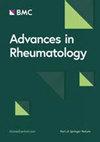银屑病关节炎患者接受功能训练与阻力锻炼的效果:随机对照试验
IF 2
4区 医学
Q3 RHEUMATOLOGY
引用次数: 0
摘要
本研究旨在评估功能性运动训练与阻力运动训练对银屑病关节炎患者的功能能力和生活质量的影响。41 名银屑病关节炎患者(18 至 65 岁)被随机分为两组:功能训练组和阻力运动组。功能训练组进行弹力带功能锻炼,功能训练组进行器械阻力锻炼,每周两次,为期 12 周。结果测量为巴斯强直性脊柱炎功能指数(BASFI)和脊柱关节病健康评估问卷(HAQ-S)用于评估功能能力和功能状态,单次重复最大测试用于评估肌肉力量,简表36健康调查问卷(SF-36)用于评估生活质量,巴斯强直性脊柱炎疾病活动指数(BASDAI)和疾病活动评分28(DAS-28)用于评估疾病活动。由一名盲人评估员分别在基线(T0)、运动开始后六周(T6)和十二周(T12)进行分析。基线时,各组的临床和人口统计学特征相同。两组的 BASFI、BASDAI、HAQ-s 和 DAS-28 均有组内改善。在生活质量评估中,除阻力运动组的 "情绪方面 "外,两组在所有方面均有组内改善。在肌肉力量方面,除 "交替肱二头肌(双侧)"练习外,两组的所有练习都有统计学意义上的改善。在改善银屑病关节炎患者的功能能力、功能状态、疾病活动、一般生活质量和肌肉力量方面,功能训练和阻力锻炼具有相似的效果。试验注册:临床试验注册:ClinicalTrials.gov:NCT04304326。注册日期:2020 年 3 月 11 日,https://clinicaltrials.gov/ct2/show/NCT04304326?term=NCT04304326&draw=2&rank=1 。本文章由计算机程序翻译,如有差异,请以英文原文为准。
Effectiveness of functional training versus resistance exercise in patients with psoriatic arthritis: randomized controlled trial
This study aims to evaluate the effect of functional versus resistance exercise training on the functional capacity and quality of life of psoriatic arthritis patients. Forty-one psoriatic arthritis patients (18 to 65 years old) were randomized into two groups: functional training group and resistance exercise group. The functional training group underwent functional exercises with elastic band and the functional training group underwent machine resistance exercise twice a week for 12 weeks. Outcome measures were: The Bath Ankylosing Spondylitis Functional Index (BASFI) and Health Assessment Questionnaire for the Spondyloarthropathies (HAQ-S) for functional capacity and functional status, one-repetition maximum test for muscle strength, the Short Form 36 health survey questionnaire (SF-36) for quality of life, and the Bath Ankylosing Spondylitis Disease Activity Index (BASDAI) and the Disease Activity Score 28 (DAS-28) for disease activity. Analyzes were performed by a blinded evaluator at baseline (T0), six (T6) and twelve (T12) weeks after the beginning of the exercise. At baseline, the groups were homogeneous in the clinical and demographic characteristics. There was a statistical intra-group improvement for both groups in the BASFI, BASDAI, HAQ-s, and DAS-28. In the quality-of-life assessment, both groups showed statistical intra-group improvements for all domains except the “emotional aspect” domain in the resistance exercise group. In the muscle strength, there was a statistical improvement for all exercises in both groups, except for the “alternate biceps (bilateral)” exercise. Functional training and resistance exercise are similarly effective in improving functional capacity, functional status, disease activity, general quality of life, and muscle strength in patients with psoriatic arthritis. Trial registration: ClinicalTrials.gov: NCT04304326. Registered 11 March 2020, https://clinicaltrials.gov/ct2/show/NCT04304326?term=NCT04304326&draw=2&rank=1 .
求助全文
通过发布文献求助,成功后即可免费获取论文全文。
去求助
来源期刊

Advances in Rheumatology
Medicine-Rheumatology
CiteScore
4.00
自引率
4.30%
发文量
41
审稿时长
53 weeks
期刊介绍:
Formerly named Revista Brasileira de Reumatologia, the journal is celebrating its 60th year of publication.
Advances in Rheumatology is an international, open access journal publishing pre-clinical, translational and clinical studies on all aspects of paediatric and adult rheumatic diseases, including degenerative, inflammatory and autoimmune conditions. The journal is the official publication of the Brazilian Society of Rheumatology and welcomes original research (including systematic reviews and meta-analyses), literature reviews, guidelines and letters arising from published material.
 求助内容:
求助内容: 应助结果提醒方式:
应助结果提醒方式:


